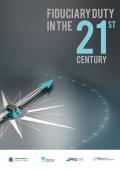Raw materials are essential for the global economy and future development depends on their continued supply. In general, their deposits in the Earth’s crust are also geographically clustered, making security of supply a potential risk. In many cases, the exhaustion of economically competitive minerals deposits in industrialized countries has made supplies increasingly dependent on the political stability of mineral-rich emerging economies. At the same time, increasing demand from these emerging markets, new technologies that require large amounts of rare minerals , low substitutability in applications and low rates of recycling have made economies more vulnerable to potential supply disruptions.

This report looks at fiduciary duty across eight markets (US, Canada, UK, Germany, Brazil, Australia, Japan and South Africa) through a series of events, interviews, case studies and a legal review. It finds that fiduciary duties have played, and continue to play, a critical role in ensuring that fiduciaries are loyal to their beneficiaries and carry out their duties in a prudent manner. It concludes that fiduciary duty is not an obstacle to asset owner action on environmental, social and governance (ESG) factors and it recommends that all of the players in the investment process take specific actions in order for ESG to be implemented on a truly global scale in order to move towards a sustainable financial and economic system.
The green bond market - bonds whose proceeds are used for green projects, most commonly climate mitigation and adaptation projects - is growing rapidly, with outstanding issuance at US$66bn in June 2015. This growth needs to be accelerated to keep pace with the climate challenge.
This briefing paper offers a range of options for building green bond markets which ultimately will help policymakers, regulators and public financial institutions meet their infrastructure investment needs, capital market development aims, and targets for climate action and environmental protection. This paper is the first result of a partnership between the Climate Bonds Initiative, UNEP Inquiry and the World Bank Group that will produce a guide to practical options for policy makers to scale up green bond markets for sustainable development.
In South-East Asia a number of stakeholders are seeking to leverage green growth strategies, to reach macroeconomic and societal goals, and engage in profitable business. Through experience however, many actors have encountered numerous obstacles and challenges in financing projects, executing transactions and facilitating climate finance flows.
Focusing on financial policy and regulatory developments in Indonesia, Vietnam, the Philippines, Cambodia and Malaysia, this reports explores the different barriers that exist to private climate finance flows in the region. It concludes that capital is hindered from moving towards low-carbon infrastructure because of a number of policy and regulatory barriers, including a lack of policy consistency and alignment, potential liquidity issues in the banking sector, and structural barriers to climate finance innovation in financial markets.
The paper focuses on the role of banking diversity on access to finance for SMEs in the green economy. It demonstrates the relationship between the green economy and SMEs, and argues that access to finance is not just a function of broader macroeconomic factors but also the structure of the banking system. Specifically, it demonstrates that different types of banks, as a result of differences in balance sheets, lending horizons, and local presence, were equipped differently to service SMEs financing needs. In particular, the analysis highlights the role of non‐commercial banks in a diverse banking sector to provide SME lending. Banking diversity contributed to a better servicing of the different financing needs in the economy and ensures a larger stability in lending to SMES during financial instability.
